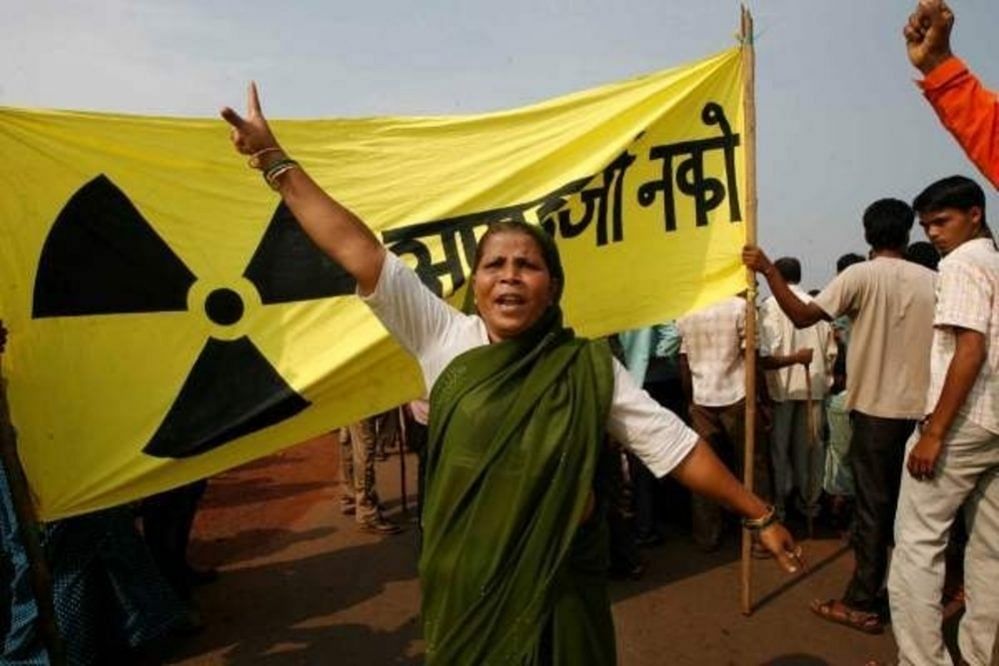India and France may sign framework agreement for this long-pending nuclear power project in Maharashtra during Emmanuel Macron visit this weekend.
Mumbai: The long-pending Jaitapur nuclear project in Maharashtra is expected to figure in talks between PM Narendra Modi and French President Emmanuel Macron during the latter’s four-day India visit on 10 March and the two countries are also likely to sign an agreement to take it forward.
With over 80 per cent of the project-hit villagers having accepted compensation for the loss of their land, the fierce anti-nuclear protests once seen as the main hurdle for the project have now become more symbolic.
The project and the protests
While Macron and Modi may hammer out a framework agreement for this project, on the same day, a group of activists and villagers will hold a protest march in the Rajapur taluka of the Ratnagiri district, where the power plant is to come up, to reiterate their opposition to it.
The nuclear power plant, for which early discussions between India and France started in the mid-80s, is proposed to be a six-reactor project with a capacity of 1,650 MW each. The Centre had given an in-principle approval to the project in October 2005.
It was to be implemented by the Nuclear Power Corporation of India Limited (NPCIL) and France’s Areva SA, which later drowned in financial distress and was taken over by Electricite De France (EDF).
Opposition to the project gathered pace in 2008, after the government started making efforts to acquire the required 938 hectares from 2,335 project-affected people. The protests, especially by villagers from around five villages, were initially the main reason for a delay in the project, even after NPCIL and Areva signed a general framework agreement in 2010.
Angry protesters said their lands were being taken by force. With the support of anti-nuclear activists, they raised concerns about radiation, earthquakes, the construction methodology and the possibility of a tsunami wave striking on the western coast though NPCIL held awareness sessions to allay these fears.
The protests had even turned violent in April 2011 when a fisherman was killed and three others were injured.
In 2013, when Narayan Rane was the state industries minister during the Congress-NCP government in Maharashtra, some protesting villagers agreed to accept the state government’s enhanced compensation. By 2015, nearly 75 per cent of the project-affected people received compensation and there was a split in the opposing groups.
Speaking to ThePrint, Satyajit Chavan, president of the Jan Hakka Seva Samiti, one of the organisations at the forefront of the protests, said the agitation is 12 years old now.
“The government put pressure on the project-affected people to accept their compensation and cases were being registered against those participating in the protests,” he said. “This scared some people, but most of the villagers are still against the project.”
Chavan agreed that the agitation has lost momentum, but justified it by saying that even the project has hardly moved forward.
“Every time our PM goes to France or vice versa, there is always something said about Jaitapur. There is not much point in taking the agitation to its peak right now because nothing is really happening,” Chavan said.
Also, focus has now shifted to a proposed oil refinery at Nanar in the Ratnagiri district, about 14 kms from Jaitapur. The nine gram panchayats of the 14 project-affected villages have passed resolutions opposing the project.
The Shiv Sena is backing the protests just as it had done for Jaitapur, and the issue is also likely to dominate Saturday’s march along with the Jaitapur nuclear project.
Accepted compensation, but protests on
In Jaitapur, a number of those who accepted the government’s compensation say their families did so under duress and they are in principle still opposed to the project.
“My parents accepted the government’s compensation when I was in Mumbai,” said Premanand Tivarkar, a resident of the Madban village.
“Government officials threatened and intimidated them saying if they don’t accept now, they aren’t likely to get anything in the future. Our opposition to the project stands,” Tivarkar, a local Shiv Sena worker, added.
Local fishermen from Sakhri Nate, a coastal village near Jaitapur, are also strongly against the project saying a nuclear plant on their coast will directly impact their livelihoods.
Meanwhile, Electricite De France is now trying to take the nuclear power project forward and work out a general framework agreement with NPCIL.
